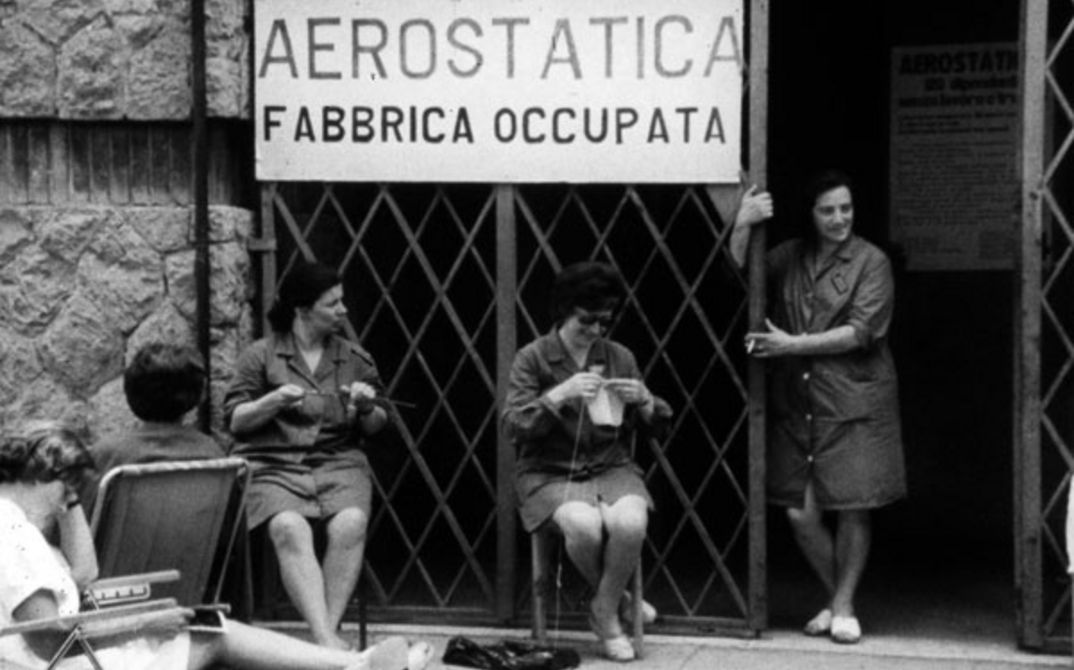DIE ENDLOSE NACHT (Will Tremper, West Germany 1962, 1. & 10.10.) All flights have been suspended at Tempelhof Airport due to fog. An exceptional situation which intervenes in the planning of the stranded passengers: business deals fall through, affairs are discovered, and dreams are revealed as such. The framework for this episodic ensemble film – a sober snapshot of West German life – is formed by the epic architecture of Tempelhof Airport.
VOUS N'AVEZ ENCORE RIEN VU (You Ain't Seen Nothing Yet, Alain Resnais, France 2012, 2. & 8.10.) This triple ensemble film brings together Resnais' core ensemble and has them assemble as an acting ensemble at a playwright's country house. Here, the illustrious group (Azéma, Arditi, Amalric, Wilson, Piccoli and more) are shown a film: footage of yet another acting ensemble, who are rehearsing Anouilh's "Eurydice". Looking at their younger colleagues becomes a look at their own youth.
WINTER SOLDIER (The Winterfilm Collective, USA 1972, 3. & 17.10.) At the start of 1971, the "Vietnam Veterans Against the War" called upon US soldiers who fought in the Vietnam War to speak about war crimes in Vietnam: about 100 veterans took part in the historic "Winter Soldier Investigation", which was documented by the Winterfilm Collective. The result is a shocking testimony about American war atrocities and the difficulties faced by those returning home to find their way back into a "normal" life.
THE PARTY: NATURE MORTE (Cynthia Beatt, Germany 1991, 5.10., with guest Cynthia Beatt & 14.10.) "It's time for a party": Queenie (Tilda Swinton) and Burrs (Lutz Weidlich) send out invitations to a glittering party, to be held on the ruins of their relationship. As darkness falls, the first guest arrives and a diverse range of vignettes begin to be combined into a mosaic of meetings, conversations, and performances. In glowing black and white, Beatt measures out the complex relationship structures of the nocturnal setting in sensitive, precise fashion.
PULP FICTION (Quentin Tarantino, USA 1994, 4. & 21.10.) A gangster couple, a killer duo, four young thieves, the wife of the gangster boss, and a sacked boxer are just some of the figures who populate Tarantino’s demi-monde milieu and initiate at times crazy, at times dark and brutal episodes surrounding money, gold, and power. Beyond time and space and good and evil, the acting ensemble performs in a complex universe of audiovisual quotes and film historical references.
MAGINO-MURA MONOGATARI (Magino Village: A Tale, Shinsuke Ogawa, Japan 1987, 6. & 15.10.) Japan’s most important documentary film director Ogawa is inextricably linked to the name of the collective he founded at the end of the 60s: Ogawa Pro. The members of the group lived and worked together, first close to Tokyo and later in the Yamagata region. It was here that a fascinating exploration of a farming culture and its deep-rooted history was created, which connects documentary scenes with staged ones.
OGAWA PURO HOMON-KI (A Visit to Ogawa Productions, Oshige Jun'ichiro, Japan 1999, 7. & 13.10.) Shortly after Ogawa and his collective moved to Yamagata to try out both new ways of living and new forms of documentary work, Nagisa Oshima visited the legendary film group and conducted numerous conversations with them. These form the centerpiece of this document of two symbolic figures in Japanese film history– Ogawa und Oshima – as well as of a film collective still unique to this day.
DEUX FOIS (Jackie Raynal, France 1968, 7. & 13.10.) This classic of feminist counter-cinema was one of the around 15 films created between 1968 and 1970 by the Zanzibar group. This informal collective of around twelve young artists can be seen as the French equivalent of the American underground. Raynal's tour-de-force revolves around a woman who undergoes a series of constant metamorphoses and thus distantly recalls a new version of Lewis Carroll's "Alice in Wonderland".
WARNUNG VOR EINER HEILIGEN NUTTE (Beware of a Holy Whore, Rainer Werner Fassbinder, West Germany 1971, 20. & 27.10.) In a hotel somewhere in Spain, a group of actors waits for the director, the star, and the film material to arrive. When the director turns up with his star, he immediately gets wrapped up in the ensuing chaos. "The film is about shooting but its real subject is how a group works, how leadership positions emerge and are exploited." (RWF)
L'AGGETTIVO DONNA (Annabella Miscuglio, Rony Daopoulos, with the Collettivo Femminista di Cinema, Italy 1971, 18. & 23.10.) This incisive analysis of the dual exploitation of female workers and the isolation of housewives edits together documentary material in ironic fashion to show how women are always defined as "adjectives", appendages of men.
THE WOMAN'S FILM (Newsreel Collective, USA 1970, 18. & 23.10) This portrait of American female workers was created by the women of the San Francisco Newsreel Collective together with their interview partners: a film about dual burdens and repression as well as about the energy of the collective.
SCHINJEL (Der Mantel, Grigorij Kosinzew, Leonid Trauberg, USSR 1926, 19. & 24.10., with a live piano accompaniment by Eunice Martins) This central work from the "Factory of Eccentric Actors" (FEKS) – a theatre and film collective that gave particular weight to décor, direction of actors, and the importance of mood – transforms Gogol’s novella into an expressionist melodrama with a crime thriller plot: a shy official is convinced to take part in a crime, the price of which is poverty and loneliness.
REJS (The Cruise, Marek Piwowski, Poland 1970, 22. & 27.10.) A cruise down the Vistula river. A man sneaks on board without a ticket and has himself voted chairman of the entertainment committee, which sets in motion a circular dance of absurd meetings, decrees, votes, and prescribed leisure activities. The ensemble of passengers consists of all the archetypes of Polish socialist society, who savor acting out the surreal situations. (mg)



